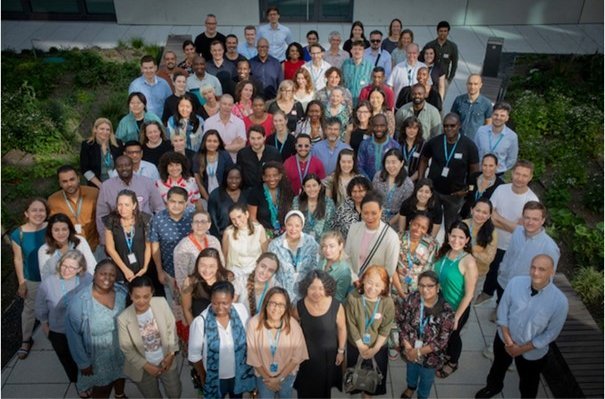Reflecting on three years of the WHO Hub for Pandemic and Epidemic Intelligence

Three years ago, the WHO Hub for Pandemic and Epidemic Intelligence was launched in Berlin in response to the urgent need to strengthen public health intelligence and improve decision-making during the COVID-19 pandemic. Here, Deputy Executive Director of the WHO Health Emergencies Programme, Dr Chikwe Ihekweazu, reflects on the WHO Hub for Pandemic and Epidemic Intelligence's work and achievements.
September 2024 | Author: Dr Chikwe Ihekweazu, Deputy Executive Director of the WHO Health Emergencies Programme
Three years ago, on 1 September 2021, we established the WHO Hub for Pandemic and Epidemic Intelligence with the support of the Government of the Federal Republic of Germany. From the very beginning, our mission has been to support countries in developing systems to generate better data and utilizing advanced analytics to make more informed decisions to prevent, prepare and respond to health emergencies.
While I can only highlight a few aspects of our work here, an extended version of this post is available on LinkedIn, and our latest annual report provides a broader overview of the extent of our work.
Collaborative Surveillance – Establishing a new guiding approach to transform the surveillance landscape
The cornerstone of our work has been establishing Collaborative Surveillance as a guiding principle to strengthen the global architecture for health emergency prevention, preparedness, response and resilience. Collaborative Surveillance transforms the current surveillance landscape by fostering enhanced data sharing and cross-border cooperation, enabling countries to better anticipate, detect, and respond to health emergencies. This approach improves decision-making by facilitating the timely and accurate exchange of information, strengthening the ability to manage crises, allocate resources effectively, and protect vulnerable populations.
Today, Collaborative Surveillance provides a powerful framework to strengthen national and regional surveillance systems. It has led to better alignment among WHO Regional Offices, Member States, public health actors, and global funding instruments like the Pandemic Fund. Under the German G7 Presidency in 2022, Collaborative Surveillance was intensively discussed and embedded into the G7 Pact for Pandemic Readiness. The European Union has adopted Collaborative Surveillance as a guiding principle in its new global health strategy.
Catalysing innovation and innovation for better insights for decision-making
The WHO Hub was designed to serve as a ‘sandbox’, to strengthen collaboration across sectors, connect diverse partners, and drive forward new innovative solutions, playing a unique role in strengthening global and national health security.
I would like to share three flagship initiatives that highlight our connect - innovate - strengthen roles:
Pathogen genomic surveillance emerged as a critical tool to inform decision-making during the COVID-19 pandemic for the early and accurate detection of new virus variants and monitoring of their circulation. However, there exist gaps in access and equity of the tools necessary for effective genomic surveillance. In May 2023, we launched the International Pathogen Surveillance Network (IPSN) to bring together organizations worldwide who are committed to improve access, equity, international cooperation and prioritise genomic surveillance on the global health agenda. In less than a year and half, this network has grown to 200 partners across 71 countries. Earlier this year, the IPSN launched a $4 million Catalytic Grant Fund to support pilot projects in low- and middle-income countries, aiming to sustainably integrate genomic surveillance into national health systems.
Another key network that has seen significant growth in these three years is the Epidemic Intelligence from Open Sources (EIOS). This platform collects and analyses hundreds of thousands of articles from a wide range of publicly available sources, helping countries navigate the vast ocean of information, extract what is important, and understand and assess it effectively– including German health authorities such as RKI. Expanded through the Hub, EIOS has tripled its user base since 2020 and now serves 96 Member States as of August 2024, with more countries expected to join with the release of an updated platform at the end of this year.
Accurate and robust disease modelling is essential to understand disease outbreaks and inform a targeted response. However, country capacities and expertise have often remained fragmented. The Hub’s Collaboratory initiative facilitates faster, more comprehensive data analysis for emerging disease threats. During this current public health emergency of international concern of Mpox, the Collaboratory community is bringing together the latest epidemiological parameters for modellers (see our August 2024 mpox update for modellers or the R-package epiparameters developed with our partner Data.org), immediately mobilised global analytics and modelling experts in regular exchange calls, and supports the WHO colleagues with data collection and analysis closely (see mpox dashboard with latest data on the outbreak).
Tackling emerging global health challenges
None of this would have been possible without the support and collaboration of our Member States and partners worldwide. Being based in Berlin, it has been a real privilege to work side-by-side with colleagues from our German partners RKI and Charité. I sincerely thank the Federal Government of Germany for its vision and unwavering support throughout these three years.
Since my reflections on last year’s anniversary, our global challenges have grown more complex. Climate change, antimicrobial resistance, and armed conflicts are exacerbating health risks. In the face of these growing challenges, the WHO Hub stands resolute in its mission. Our commitment to fostering trust, building partnerships, and driving innovation remains stronger than ever. The stakes are high, but so is our determination to build a safer, healthier world for all.
We have invited Dr Chikwe Ihekweazu (WHO Hub for Pandemic and Epidemic Intelligence) to share his reflections for our website. The article is written from the organisation's subjective viewpoint and invites readers to gain nsights into the WHO Hub for Pandemic and Epidemic Intelligence's activities.
Image: WHO/ Alfonso Moral
